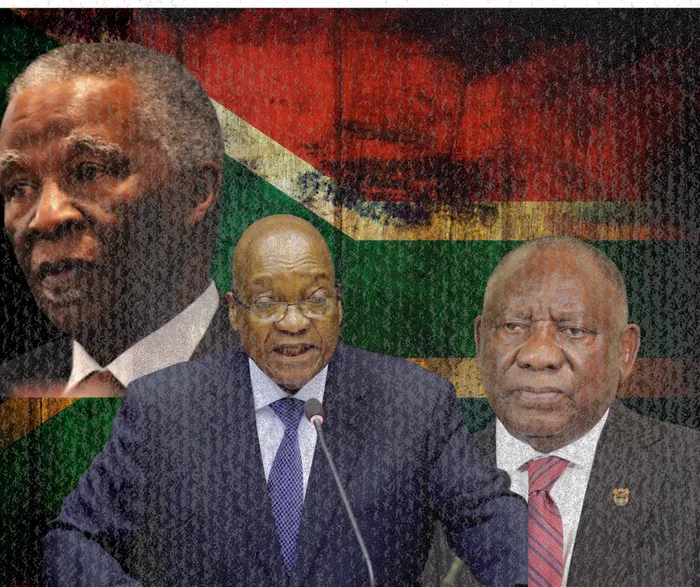Mbeki vs Zuma vs Ramaphosa: Who delivered more in health and education?

From Mbeki to Ramaphosa, each leader promised progress in health and education. The results tell a more complicated story.
Image: Independent Media Photographers / IOL graphics
Three presidents – Thabo Mbeki (1999–2008), Jacob Zuma (2009–2018), and Cyril Ramaphosa (2018–present) – each arrived promising progress in health and education, yet the legacies in these domains vary in scale, pace, and emphasis.
Data and audits sketch a long arc of investment, policy shifts, and public campaigns that culminate in a landscape of stark regional disparities, ongoing infrastructure expansion, and schooling quality that continues to shape everyday life for millions.
Persistent regional inequities in hospital and clinic access and health fund allocation marked health infrastructure in Mbeki’s era (1999–2008).
A 2011 National Library of Medicine report notes that wealthier provinces such as the Western Cape and Gauteng attracted more health funding, while poorer provinces like Limpopo had fewer hospitals and doctors per capita.
The study described an “infrastructure–inequality trap,” whereby existing disparities in infrastructure influenced the distribution of health spending.
Hospital capacity nationwide remains difficult to quantify in public records for the period, though landmarks such as Chris Hani Baragwanath Hospital in Soweto persisted as central public health hubs.
The same Mbeki era saw civil-society tensions around health policy with the Treatment Action Campaign (TAC) versus Mbeki, and later Section27 reporting on the erosion of governance principles when independent groups pressed campaigns that ran counter to party lines.
Zuma’s presidency (2009–2018) pivoted to scale in health and education promises.
In a September 2014 address at the opening of the Harry Surtie Hospital in Upington, Northern Cape, Zuma announced the construction of over 300 new health facilities, including 160 clinics, as part of a broader drive to expand access to public health services.
On education, Africa Check’s 2016 assessment – based on multiple data sources, including a 2015/16 target – suggested that Zuma-era initiatives could have yielded hundreds of schools, with 49 new schools launched in 2012 in the Eastern Cape, among other developments.
Ramaphosa’s presidency (2018–present) has concentrated on health infrastructure modernisation and reform, with a sustained push toward improving care quality through the National Health Insurance (NHI) framework and filling nursing and doctor posts.
Notable milestones include the 2023 opening of Dr Pixley Ka Isaka Seme Memorial Hospital in KwaMashu, KwaZulu-Natal, and ongoing promises to revitalise health infrastructure, focusing on underserved communities.
In education, Ramaphosa’s term has been marked by a public embrace of high matric pass targets and a renewed emphasis on school infrastructure, including Thuma Mina-driven commitments, such as the delivery of three state-of-the-art schools in KwaZulu-Natal in 2019.
In 2020, Ramaphosa highlighted an 81.3% matric pass rate, which he said was the highest since the dawn of democracy in 1994.
This milestone was evidence of progress beyond the 60% benchmark ministerial leaders had once celebrated as a landmark. This line was first crossed under Education Minister Kader Asmal in 2001 with a 61.7% pass rate.
By contrast, Zuma’s tenure was associated with a 60.6% matric pass rate in 2009. Ramaphosa later cited an 87% pass rate in 2024 - a statistic framed as a broader improvement across the education landscape.
Zuma also saw some benefits in higher education, with the establishment of institutions like Sol Plaatje University in the Northern Cape and Mpumalanga University focusing on heritage studies and agricultural-biodiversity programs, respectively.
Weighing in, Political analyst Professor Sipho Seepe criticised Ramaphosa’s leadership, arguing that he is “the worst president this country has produced. " He accused Ramaphosa of lacking ideas and pursuing crowd-pleasing strategies.
“Whichever way one slices the data, Cyril Ramaphosa's presidency has been a disaster for the economy,” said Seepe.
Seepe pointed to perceived shortfalls in fiscal discipline and infrastructure funding, citing a widely cited Business Day piece that argued a promised R100 billion infrastructure fund failed to materialise, and noting that pledges from summits did not translate into sustained gross fixed capital formation (GFCF).
He contends that Zuma’s presidency was unfairly portrayed negatively despite substantial health and education gains, including the rollout of antiretroviral drugs and the expansion of school nutrition programs.
“Mbeki is credited with the establishment of the post-1994 statecraft. His tenure was, however, marred by his views on HIV/AIDS and refusal to invest in Eskom infrastructure. It is this failure that led to loadshedding. Opinions differ on whether he has since acknowledged this erroneous decision.”
Independent political analyst Sandile Swana suggests nuanced progress, arguing that while Western Cape and Gauteng perform relatively well on global measures of science and mathematics, other provinces lag in international comparisons, particularly in black schools.
He asserts that no president has been able to close the performance gap between black and white schools on an international benchmark, even as regional improvements occurred.
“Whether it was under Mbeki or under Zuma or under Ramaphosa, the only conclusion we can draw is that there were no improvements; in fact, there was a slight decline during the Ramaphosa period… You know when your number is last, you're just the previous number,” said Swana
Meanwhile, Ramaphosa, during his SONA, announced a large-scale infrastructure investment - more than 1 trillion Rand over three years, focusing on health, education, and underserved areas - which he said will strengthen service delivery and expand access.
Speaking at an infrastructure summit in Cape Town in April, he said his plan to boost the economy by launching major construction projects has attracted a record 238 billion rand (about $13.3 billion) in investment.
Ramaphosa said the government’s new construction pipeline for the fiscal year starting April 1 includes around 250 projects, adding that these cover key sectors such as energy, roads, and water, Business Insider Africa reported.
Ramaphosa’s spokesperson, Vincent Mangwenya, did not respond to questions from IOL.
thabo.makwakwa@inl.co.za
IOL Politics
Related Topics: